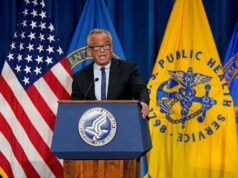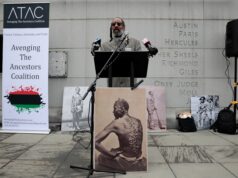
BIRMINGHAM, Ala. — This Juneteenth holiday a group of Glenmary Home Missioners will have a deeper appreciation for the historic struggle of African Americans for freedom and equality in the United States. The federal holiday June 19 is a commemoration of the end of slavery in the U.S. at the conclusion of the Civil War.
The Glenmary group recently completed a mid-May pilgrimage through Alabama, Mississippi and Tennessee, stopping and praying at significant sites in the slavery era and the U.S. Civil Rights Movement of the 1950s and ’60s, and to meet with contemporary community workers.
Thirteen of the 31-member pilgrimage group were Kenyan and Ugandan students in Glenmary formation; others were priests, brothers and lay co-workers primarily from the U.S.
“The point was to have an encounter, an opportunity for them to gain a better understanding of the Southerners they’ll be working with,” Father Dan Dorsey, president of Glenmary, told OSV News. “But the most important thing for me was that the participants had a profoundly spiritual experience, where people see Christ in the experience of others, whether that’s in a museum or in the people who continue to struggle for justice.”
Trip coordinator Polly Duncan Collum, Glenmary’s director of justice, peace and integrity of creation, echoed that sentiment. “It was a tour, and a time of reflection. But also, it was a connection between the past and the present in the meeting community organizers and leaders working for racial and economic justice,” she said.
She offered the example of a meeting with Bishop Joseph R. Kopacz and a multiracial coalition in Jackson, Mississippi, of which the Diocese of Jackson is a member.
In Birmingham, Alabama, pilgrims visited sites commemorating the 1955-56 bus boycott, a key moment in civil rights history. The yearlong boycott, started by the act of defiance by civil rights activist Rosa Parks, brought newly minted preacher the Rev. Martin Luther King Jr., into a leadership position that would persist until his murder in 1968. (Parks met with St. John Paul II during his 1999 pastoral visit to St. Louis.)
The pilgrims also visited Birmingham’s 16th Street Baptist Church, where a 1963 Ku Klux Klan bombing caused the death of four child congregants. Across the street was Kelly Ingram Park, where months later police, seen on national television, viciously attacked child protesters with police dogs, fire hoses and water cannons. Today, sculptures and a civil rights museum commemorate those events. Interpreters helped the pilgrims to see the strategy of Civil Rights activists to engage law enforcement in the public eye. Repeatedly, though, the racist reaction was more violent than the activists had anticipated.
Pilgrimage participants later walked across the Edmund Pettis Bridge in Selma, Alabama, where marchers were viciously attacked by law enforcement in 1965 as the nation looked on. These were key events that eventually led to the U.S. Civil Rights Act of 1964, championed by President Lyndon B. Johnson.
In Mississippi, the group also stopped to pray at the Canton home of Servant of God Sister Thea Bowman, whose cause for canonization is underway. Sister Thea (1937-1990), a key leader in the Black Catholic movement, worked for intercultural understanding in churches across the United States. She was the first African American to be a member of the Franciscan Sisters of Perpetual Adoration.
Moses Ngund’u, a Glenmary seminarian from Nakuru, Kenya, said what struck him most was listening to the stories of Parks and Rev. King, “especially the way he advocated for a peaceful resolution.”
Seminarian Evarist Mukama was moved by being in the 16th St. Baptist Church, “where the four little girls were killed, innocent as they were, and the scene for their parents and friends. I asked myself, ‘Will there be any point where there will be equality for all?'”
When he saw a museum display of KKK robes, seminarian Philip Langford, a Texan from a multiethnic family, was brought back to a childhood experience.
“I actually have a memory of encountering the KKK,” he said, recalling a 2004 cross-country family car trip from Texas to Florida, with a gas stop in Mississippi. “Coming down the road a group of Klansmen were carrying a cross. I remember my mother immediately told me to lie on the floorboard. I was just reminded of all of that today. I can imagine how somebody who went through the Civll Rights Era, with all of the lynchings, would have responded to that cross.”
Langford added, “The most jarring thing for me was all of the hatred, and I would argue that it’s still there today. And I don’t know if I would say quieter, because it’s getting louder and louder.”
“Very much!” was Deacon Joseph Maundu’s response when asked whether he thought this pilgrimage might have an impact on his ministry. The deacon spoke of prejudice today: “When you know the history of a place, and then experience things there, you know it’s not about you. It’s about the issue, about what happened there. And you stop your own prejudices. We can sympathize with other people. I think this (pilgrimage) experience will give us a positive approach.”
Another stop in Mississippi was the Jackson home, now National Historic Landmark, of slain civil rights activist Medgar Evars. He was targeted and killed in his driveway by an assassin, his wife and young children close at hand. Another stop, outside of Greenwood, Mississippi, was the site of Bryant’s Grocery and Meat Market, where Emmett Till, a Black 14-year-old, was falsely accused of flirting with and touching a white woman. He was kidnapped, tortured and murdered by her relatives.
One evening the pilgrimage group was hosted by Resurrectionist Father Manuel Willams at the Resurrection Catholic Missions of the South. The 81-year-old ministry has included a variety of educational and health care services to the local community and recently hosted volunteers from various Catholic universities.
Father Willams told the pilgrims, “The root of all ‘isms’ is the lack of proximity.”
Then he invited those gathered, which included a group of student volunteers from Misericordia University in Dallas, Pennsylvania, to be closer to the Montgomery experience by listening to veteran civil rights activists. He introduced a small panel, including former Carter White House staffer Doris Crenshaw, who has a history in civil rights from the time in the 1950s when she was vice president of the NAACP Youth Council, under the advice of Rosa Parks. She was 12 at the time.
“Our lives are in your hands,” she told the young women from Misericordia. All of the rights movements in the world were compelled by the women and the youth.” It was the only time the pilgrims were joined by an outside group.
The Civil Rights Pilgrimage ended in Memphis, Tennessee, where the group attended Mass at Christian Brothers University. Earlier in the day the pilgrims had been at the National Civil Rights Museum, built around the Lorraine Motel, where Rev. King was assassinated.
Father Dorsey implored those at Mass, “Listen to our pain. Listen to our hope. Listen to who we are. And just be present.” It was a church-driven fight for rights, he had said earlier. He echoed that at the end: “We must always have a vision of hope. We must never give in to fear. Let’s always be those people, our heroes, who in the midst of it all, stood up to incredible violence. Fear did not give way.”
On the road back across Alabama to homeward-bound travel from Birmingham, Mukama looked back on the weeklong pilgrimage and said, “What stood out to me was the struggle for freedom. That first was started by the Blacks who came here as slaves, and who have been slaves in most other continents. One of the quotes that really comes out clear for me is, ‘No one is free until everyone is free.'”
“The slavery, or segregation, or whatever else happened to Blacks is not just limited to the Blacks, but to the wider community of humanity,” Mukama added. “I’ve walked all the steps on this pilgrimage from first up until the last and that’s what stands out for me: Humanity needs to be free.”

















